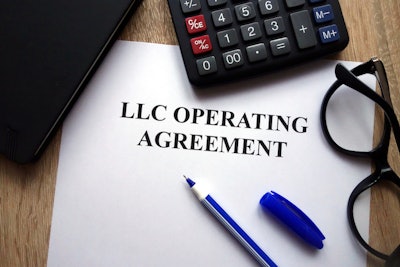
Maybe you’re a one-man show who’s ready to start hiring employees, or you’ve got a seasoned crew that’s ready to buy more trucks and expand operations. Either way, your tax accountant is probably making the annual plug to set up an LLC, and you may be scratching your head wondering if it’s worth jumping through all those hoops.
In this article, we’ll run through some of the advantages and disadvantages of setting up an LLC, providing you with the details that you need to make an informed decision.
Advantages of an LLC
LLCs have several benefits. Here are a few of the key advantages you can expect to enjoy.
Direct involvement
If you’ve operated as a sole proprietorship until now, you’re probably used to having full control over how your business operates day-to-day. Good news: as an LLC, you don’t have to give that up.
Whereas corporations have to deal with many different policies and approaches from everyone involved in management, LLCs have more flexibility. You don’t have to appoint directors or officers. Instead, as the owner, you can continue being directly involved in how your landscaping business is run — just like you were before.
Separates business and personal assets
An LLC creates a degree of separation between you and your business, which can protect you legally.
When you have a sole proprietorship or partnership, all of your personal and business assets are connected. So, if any accusations come up against your business, that could hurt you personally. That’s why having your property and your bank account tied to your business isn’t always a good idea.
With an LLC, however, your business is separate — meaning personal liability is not as big of a deal.
Pass-through taxation
As an LLC, tax time will look a little different.
LLCs actually don’t have a specific federal tax classification. The IRS will automatically mark your LLC as a partnership or a sole proprietorship, and you’ll be eligible for pass-through taxation.
Instead of paying corporate taxes, the profits and income from your LLC will pass to your personal tax return. Ultimately, you’ll be taxed just once instead of twice (like a C corporation would be), and you can still take advantage of all those lucrative tax write-offs that you’ve been using with your proprietorship.
Disadvantages of an LLC
An LLC has a lot of benefits, but carries a few disadvantages, too.
Expenses
An LLC takes a little more cash to run than a sole proprietorship or partnership. Associated costs might include start-up fees such as paperwork and an Employer Identification Number (EIN), in addition to annual fees like franchise tax and reporting fees that vary depending on your state (with a late fee if you miss the deadline).
What’s more, you can’t cash a check made out to an LLC. Instead, you have to deposit the check in a corporate account, which might incur a higher fee at certain banks.
If you decide that an LLC and its benefits would work for you, be sure to count the extra cost.
Record keeping requirements
When you set up an LLC, you’ll need to begin doing separate record keeping. Your company needs records that are distinct from your own personal business and creating an LLC will take a lot more paperwork.
LLCs don’t have to keep extensive records, but they do have to keep separate ones, which will end up as more work for you.
Remember how an LLC separates out your business and personal life? That’s an advantage in many ways — but it does create more paperwork, and you’ll need to keep meticulous records to ensure your personal and business assets are managed correctly and separately.
That said, extra record keeping shouldn’t turn you off from creating an LLC. You simply need to be prepared to do the extra work that’s involved.
Ready to get started?
You can set up an LLC on your own through your state’s online business registration system, a process that usually requires a couple of hours and some nominal fees to reserve your business name and register the business.
That said, we’d highly recommend working with an expert who can guide you through the process. Whether you opt for a small business specialist at your local bank, a tax specialist at your accounting agency or a business law attorney like WH Law in Little Rock, it really helps to partner with a pro who can ensure you get everything right.
EDITOR’S NOTE: This article was written by Jana Gray, a professional copywriter, freelance writer and avid outdoor enthusiast from Seattle, Washington.









